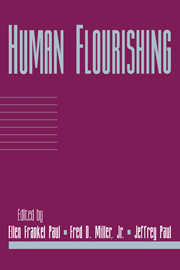Book contents
- Frontmatter
- Contents
- Introduction
- Acknowledgments
- Contributors
- Human Flourishing and the Appeal to Human Nature
- The Three Faces of Flourishing
- Flourishing Egoism
- The Idea of a Life Plan
- Human Flourishing Versus Desire Satisfaction
- Happiness and Human Flourishing in Kant's Ethics
- Valuing Activity
- Ancient Perfectionism and Its Modern Critics
- Aristotle's Elusive Summum Bonum
- Eudaimonism, Love and Friendship, and Political Community
- No Families, No Freedom: Human Flourishing in a Free Society
- Politics, Neutrality, and the Good
- Human Flourishing and Universal Justice
- Index
Human Flourishing and the Appeal to Human Nature
Published online by Cambridge University Press: 05 October 2013
- Frontmatter
- Contents
- Introduction
- Acknowledgments
- Contributors
- Human Flourishing and the Appeal to Human Nature
- The Three Faces of Flourishing
- Flourishing Egoism
- The Idea of a Life Plan
- Human Flourishing Versus Desire Satisfaction
- Happiness and Human Flourishing in Kant's Ethics
- Valuing Activity
- Ancient Perfectionism and Its Modern Critics
- Aristotle's Elusive Summum Bonum
- Eudaimonism, Love and Friendship, and Political Community
- No Families, No Freedom: Human Flourishing in a Free Society
- Politics, Neutrality, and the Good
- Human Flourishing and Universal Justice
- Index
Summary
[Aristotle] certainly does think that the nature of man—the powers and needs all men have—determines the character that any satisfying human life must have. But since his account of the nature of man is in general terms the corresponding specification of the best life for man is also general. So while his assumption puts some limits on the possible answers to the question “how shall I live?” it leaves considerable scope for a discussion which takes account of my individual tastes, capacities, and circumstances.
– J. L. Ackrill, Aristotle's EthicsINTRODUCTION
If “perfectionism” in ethics refers to those normative theories that treat the fulfillment or realization of human nature as central to an account of both goodness and moral obligation, in what sense is “human flourishing” a perfectionist notion? How much of what we take “human flourishing” to signify is the result of our understanding of human nature? Is the content of this concept simply read off an examination of our nature? Is there no place for diversity and individuality? Is the belief that the content of such a normative concept can be determined by an appeal to human nature merely the result of epistemological naiveté? What is the exact character of the connection between human flourishing and human nature?
These questions are the ultimate concern of this essay, but to appreciate the answers that will be offered it is necessary to understand what is meant by “human flourishing.” “Human flourishing” is a relatively recent term in ethics.
- Type
- Chapter
- Information
- Human Flourishing , pp. 1 - 43Publisher: Cambridge University PressPrint publication year: 1999
- 8
- Cited by



